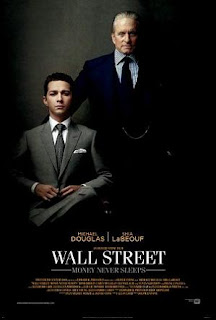Wall Street: Money Never Sleeps (**½)
Directed by: Oliver Stone
Starring: Michael Douglas, Shia LaBeouf, Carey Mulligan,
Josh Brolin, Eli Wallach, Susan Sarandon, Frank Langella
Seen: September 24th 2010
**½ Out of ****
Wall Street: Money Never Sleeps, starts with the release of
Gordon Gekko (Douglas) from prison in the year 2001 – he is unceremoniously
dumped back into society on a very limited budget, which he starts using to,
among other things, write a book: Greed is Good. In his marketing of the book
he hints at an looming stock market crash, but as he is mostly regarded as a
has-been, he is ignored.
This sequel to the iconic 80’s movie with the even more
iconic main character, Gekko, opts to follow
an arc in the life of Jake Moore (LaBeouf) during the year 2008. He is a young
Wall street broker with a seemingly bright future ahead of him, and he is the
main character, leaving Gekko on the sidelines for long stretches of this movie.
Near the beginning of the movie Jake is given a spot bonus of just over $1.4
million by his father-figure boss, Louis Zabel (Langella), so we know the
stakes are high and the money is rolling. The time-frame of the movie puts it
right before and leading into the most recent global economic meltdown, and
when Bretton James (Brolin) and his team of investment bankers start rumours,
Keller Zabel, Louis Zabel’s and by extension Jake Moore’s firm goes under. This
leads to Zabel’s suicide, and Jake takes this personally, undertaking revenge
against James.
Jake is in a relationship with Winnie (Mulligan), Gekko’s
estranged daughter. She wants nothing to do with her father, as she knows a
little of what he is, the same character we as viewers know from 23 years back.
Jake wants to get closer to Gekko, who he thinks he can learn from and who also
gives him some scraps of info which he uses against Bretton James, but Gekko
drives a wedge between Jake and Winnie as the movie progresses.
The economic intrigue is once again there, but this time
director Oliver Stone tries to weave much more reality into the story – events in
this movie tie in directly to the 2008 collapse and eventual bail-out packages
from the US government. Gordon Gekko is not as clear-cut as he was in the
original movie, here he has good intentions one moment, and not-so-good the
next. He sells the idea that time is more important than money, and in these
moments you feel that the movie tries to almost preach that money isn’t
everything – but then it doesn’t take too long for an emotional situation to be
mediated/solved when it is revealed that the money is not lost anymore – a moralistic
swing in a value system the movie tries at times to hand to the viewer.
Douglas, in his limited time on screen, brings back glimpses
of the old Gekko, and he is, good guy or not, the character you most want to
see during the movie. LaBeouf is good as Jake, a more innocent and morally
upstanding version of the original movie’s Bud Fox (who has a delicious cameo
in this movie: “Does Blue Horseshoe still love Anacot Steel?”), and his
portrayal of both the betrayer and the betrayed at different stages of the
movie somehow grounds the movie in humanity – an opposite of sorts to Gekko.
Carey Mulligan is supposed to be a more significant character, but she is used
more as a plot device to advance/damage the relationship between Moore and
Gekko than a real person; she spends quite a lot of screen-time crying or being
angry/stubborn (mostly with reason though). Josh Brolin is very good as the
villain, but his character never really chills the way the oft-good guy,
oft-bad guy Gordon Gekko does when he gets going.
Wall Street: Money Never Sleeps is definitely not a bad
movie, and many will enjoy the speculation around reasons for the 2008 economic
crashes, but it somehow doesn’t really make it as either a drama (money still
controls emotions and even such a powerful thing as forgiveness in a movie
where the opposite is at times hinted at), or a thriller (everything ends up
too pretty-sitting, too perfect, no-one really loses anything). Wall Street:
Money Never Sleeps will leave those who didn’t see the original unaffected to
bored (as it is, at 2:14, far too long), and those who saw it and enjoyed it
slightly nonplussed as the dark edge of the first movie is not present here.



Comments